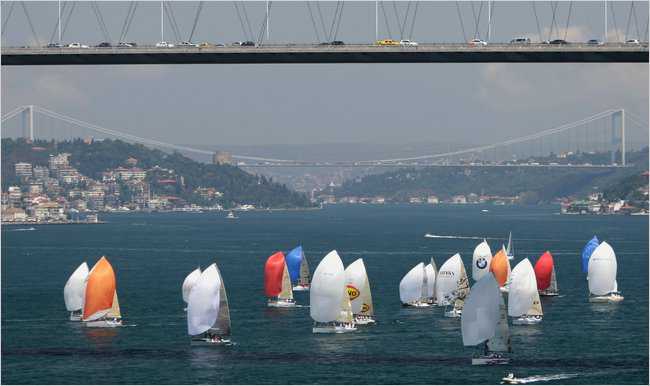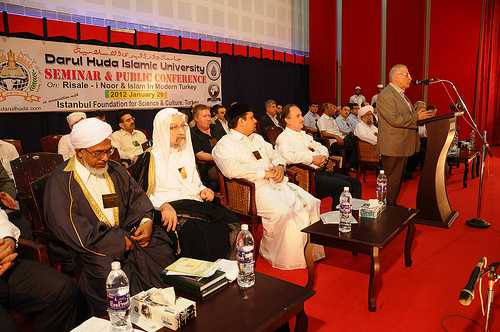By SUSANNE GÜSTEN
ISTANBUL — On the night of July 12, 1960, tanks rumbled into Urfa, the military imposed a curfew on the town, and armed troops cordoned off the shrine of Abraham at the heart of the city.
As the town in southeast Turkey held its breath, soldiers forced their way into the shrine, smashed open a marble tomb with sledgehammers and removed a shrouded body. The body was lifted onto an army truck, driven along heavily guarded streets to an airfield outside town, loaded onto a military plane and never seen again.
The date was six weeks after the Turkish coup d’état of 1960, in which a military junta had seized power in Ankara. This was the first of a series of coups that was to rack the country for the rest of the century.
The body was that of Bediuzzaman Said Nursi, a charismatic Islamic scholar, whose grave had been drawing thousands of pious mourners to Urfa since he had been laid to rest there in March of that year.
“The military rulers were afraid that Nursi would become a symbol of dissent, his grave a shrine to anti-Kemalism,” Ihsan Yilmaz, an expert for Turkish Islam at Fatih University in Istanbul, explained in an interview last week.
The ploy of removing his body worked in the short term, Mr. Yilmaz said, as followers were discouraged from openly showing their support for the teachings of a man who had clashed with the founder of the republic, Mustafa Kemal Ataturk, over the role of religion in society.
But in the long run, it did not work. Through his writings, collected in the “Risale-i Nur,” or “Epistles of Light,” and clandestinely photocopied and distributed by his students, Mr. Nursi’s ideas continued to resonate in Turkey, inspiring a uniquely Turkish Islamic identity and a powerful faith-based movement that shapes the country’s society and politics to this day.
“It is no exaggeration to say that Nursi is the most influential theologian of the Turkish Republic,” Mustafa Akyol, another expert on Turkish Islam, said in an interview in Istanbul.
Now, with the shadow of the military removed from the country and immunity from prosecution for all its dealings lifted by a popular referendum two years ago, a parliamentary commission investigating the coups has called for Mr. Nursi’s secret grave to be revealed at last.
The call was included in a list of recommendations issued by the commission in its final report this month, along with more obvious measures such as subjecting the armed forces to democratic control, purging school curriculums of militaristic ideology, and renaming streets and buildings that were named for coup leaders.
“The state owes Nursi an apology,” Selcuk Ozdag, a member of Parliament for the ruling Justice and Development Party, or A.K.P., and member of the commission, said by telephone from Ankara. Finding the body was “vital to reconciliation between the people and the state,” he added.
To this end, the commission interrogated surviving members of the 1960 junta and searched the state archives for information about Mr. Nursi’s final resting place. But Ahmet Er and Numan Esin, who sat on the 38-member junta and are now aged 85 and 83, told the commission that even they had not been privy to that information.
Only Alparslan Turkes, a former junta member who died in 1997, had known, Mr. Er said in his testimony. And neither police records nor the archives of the prime minister’s office or local governors’ offices turned up any clues as to the whereabouts of the remains, the Interior Ministry reported to the commission.
“We will not leave it at that, we are going to find that information, because it is documented somewhere,” Mr. Ozdag vowed.
The coup commission has recommended that Parliament follow the issue up in a new committee charged with righting the wrongs of the coup era, he said.
The hearings have triggered a popular quest for Mr. Nursi’s grave, with new witnesses coming forward in the media and contributing pieces to the puzzle.
On television, one such witness, a former editor of the Hurriyet daily, this month recounted a night of tension and turmoil at the Afyon Air Base, where he was serving as a recruit at the time and where the plane carrying Mr. Nursi’s remains is thought to have landed.
“A noncommissioned officer later told me they had buried a body near the highway between Afyon and Isparta that night,” the witness, Erol Turegun, said.
via Turkey Seeks a Spiritual Leader’s Secret Grave – NYTimes.com.
more :


